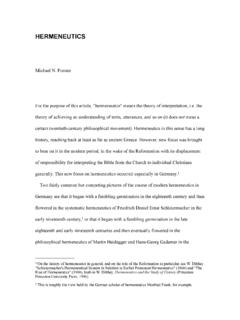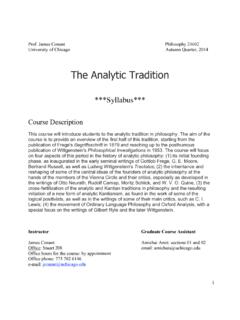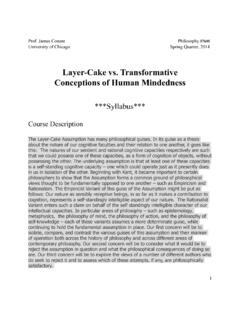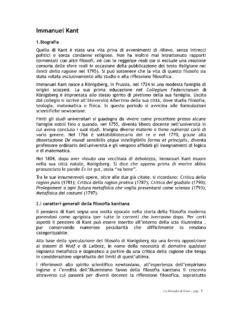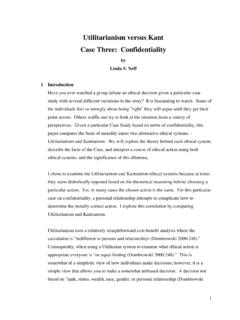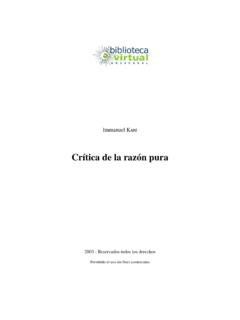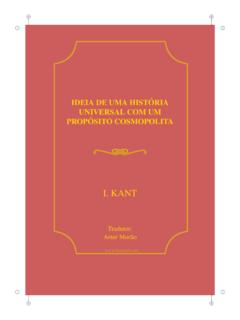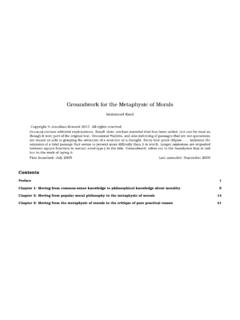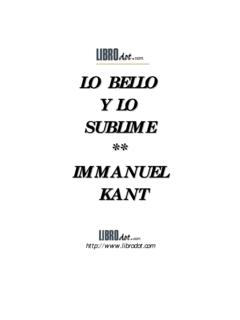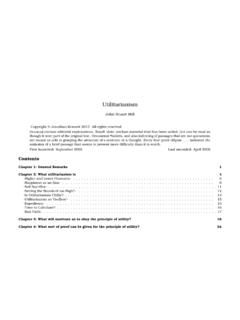Transcription of KANT’S PHILOSOPHY OF LANGUAGE? - University …
1 Tijdschrift voor Filosofie, 74/2012, p. 485-511doi: 2012 by Tijdschrift voor Filosofie. All rights ANT S PHILOSOPHY OF LANGUAGE? by Michael N. Forster (Chicago)As is by now fairly well known, an intellectual revolution of sorts occurred in Germany during the second half of the eighteenth century which gave birth to the PHILOSOPHY of language as we have known it The main protagonists of that revolution were Johann Georg Hamann and Johann Gottfried von Herder. The philosophers of the Enlightenment had usually conceived of the relation between thoughts and concepts (or ideas ), on the one hand, and language , on the other, in a sharply dualistic way: thoughts and concepts were in principle quite separable from whatever expression in language they might hap-pen to receive (so that they could in principle occur without it), devel-oped autonomously of it, and merely employed it as a useful means for memorization and especially for communication with other people.
2 In dramatic opposition to this orthodox Enlightenment picture, Hamann and Herder introduced two starkly contrary doctrines: (1) Thought is essentially dependent on and bounded by (Hamann even goes as far as to say: identical with) language a person can only think if he has Michael N. FORSTER (1957) is Glen A. Lloyd Distinguished Service Professor in PHILOSOPHY at the University of Chicago, where he served as chair of the PHILOSOPHY Department for ten years, and recently won an Alexander von Humboldt Professorship from the Humboldt Foundation. His research interests focus historically on German PHILOSOPHY and ancient PHILOSOPHY , and thematically on epistemology and PHILOSOPHY of language . His recent books include Kant and Skepticism (Princeton UP, 2008), After Herder. PHILOSOPHY of language in the German Tradition (Oxford UP, 2010), and German PHILOSOPHY of language . From Schlegel to Hegel and Beyond (Oxford UP, 2011).
3 1 See the classic works on this subject by Isaiah BERLIN, Ian HACKING, and Charles TAYLOR. Also, FORSTER, After Herder. PHILOSOPHY of language in the German Tradition and ID., German PHILOSOPHY of language . From Schlegel to Hegel and Beyond. 95731_TSvFilosofie_2012 48595731_TSvFilosofie_2012 4853/10/12 07:453/10/12 07:45486 Michael N. FORSTERa language and can only think what he can express linguistically. (2) Concepts or meanings are not the sorts of items independent of language that much of the philosophical tradition has understood them to be, for example, referents, Platonic forms, or the subjective mental ideas favored by the Cartesian tradition and the British Empiricists, but instead usages of words.
4 (In what follows, I will refer to these two doctrines as doctrines (1) and (2).)Kant was a contemporary of Hamann and Herder, and knew them both well: Kant and Hamann both spent most of their lives in K nigs-berg, and had a fairly close, though tense, relationship that lasted from 1759 until Hamann s death in 1788. Herder came to study at the University of K nigsberg in 1762, where he attended Kant s lectures and quickly became one of Kant s favorite students. After leaving K nigsberg in 1764, Herder remained in direct contact with Kant for several years, before their relationship dwindled to indirect communi-cation through Hamann, and eventually a famous and bitter intellec-tual feud. However, despite Kant s close relationship to Hamann and Herder, a longstanding picture of Kant represents him as continuing the Enlightenment s thought- language dualism and missing the boat of the new PHILOSOPHY of language .
5 This picture was already propagated by Hamann and Herder them-selves. In a famous negative response to Kant s Critique of Pure Reason (1781) that Hamann wrote with the encouragement of Herder and sent to Herder in 1784, titled Metacritique on the Purism of Reason (t hough circulated privately at the time, it was not published until 1800), Hamann leveled the charge that Kant, in continuity with such Enlight-enment predecessors as Berkeley and Hume, had divorced reason and concepts from language and attributed to them sovereignty over it, instead of recognizing their virtual identity with it. This was the third of three misguided ascriptions of purity to reason of which Hamann accused Kant s book (the other two concerned reason s divorce from and sovereignty over tradition/custom, and reason s divorce from experi-ence):Th e fi rst purifi cation of reason consisted in the partly misunderstood, partly failed attempt to make reason independent of all tradition and custom and 95731_TSvFilosofie_2012 48695731_TSvFilosofie_2012 4863/10/12 07:453/10/12 07:45 KANT S PHILOSOPHY OF language ?
6 487belief in them. Th e second is even more transcendent and comes to nothing less than independence from experience and its everyday induction [..] Th e third, highest, and, as it were, empirical purism is [..] concerned with language , the only, fi rst, and last organon and criterion of reason, with no credentials but tradition and usage [..] Receptivity of language and sponta-neity of concepts! From this double source of ambiguity pure reason draws all the elements of its doctrinairism, doubt, and Herder then went on to publish his own more elaborate Metacritique on the Critique of Pure Reason in 1799, which basically repeated the same accusation against Kant concerning the relation of reason and concepts to language (along with a host of others). This way of interpreting Kant on the relation of thought and con-cepts to language has been very common since the eighteenth century as well (whether with Hamann and Herder s negative assessment of the position ascribed to Kant or not).
7 For example, a recent book on Kant by Wayne Waxman interprets him in roughly the same way, represent-ing him as a thinker who, in continuity with such Enlightenment pre-decessors as Locke, Berkeley, and Hume, works purely at the level of psychology, and accords no fundamental role to language : Kant s account of discursive understanding provides an excellent illustration of how limited and tenuous the relation is between a theory of ideas and a theory of linguistic discourse [..] Any residual temptation we may feel to compare thought as Kant portrayed it with linguistic discourse will surely be kept to a minimum when we note that his psychologistic explications resolve the elements of discursive thought into a non-discursive psychological pro-cess from which everything linguistic in nature has been excluded in favor of the nature and workings of the individual, isolated psyche: judgment is that action of the understanding, whereby the manifold of given representations (they may be intuitions or concepts) are brought under one apperception in general (BI43; also Logic, #17); thought is the action of bringing the syn-thesis of the manifold given to it elsewhere in intuition to the unity of apper-ception (B145); and a concept is a unitary consciousness in which the manifold successively intuited and then also represented is united in one representation (A103).
8 3 2 HAMANN, Writings on PHILOSOPHY and language . Ed. K. HAYNES, Cambridge, Cambridge UP, 2007, pp. 207-8. 3 W. WAXMAN, Kant and the Empiricists. Understanding Understanding, Oxford, Oxford UP, 2005, p. 103. 95731_TSvFilosofie_2012 48795731_TSvFilosofie_2012 4873/10/12 07:453/10/12 07:45488 Michael N. FORSTERM oreover, at least at first sight, this whole line of interpretation seems amply justified. For, as Waxman rightly implies here, Kant in the Cri-tique of Pure Reason, as well as in his other two Critiques (t he Critique of Practical Reason [1788] and the Critique of Judgment [179 0]), s c r u pu -lously avoids using such terms as language , sentence , and word in fundamental explanatory roles, in favor of using such purely psycho-logical terms as thought , judgment , concept , representation , intui-tion , principle , schema , idea , and so on; and moreover, when he defines the latter terms, again avoids using terms which refer to lan-guage, instead employing only psychological ones.
9 Nor does Kant at any point in the Critique of Pure Reason or the other two Critiques accord language anything more than an inessential and subordinate role. Indeed, even the one modest exception which Waxman seems ready to concede, namely Kant s treatment of the logical functions of judgment in the Metaphysical Deduction of the Critique of Pure Reason,4 could safely be dropped: in that work logical functions of judgment are again conceived by Kant in purely psychological rather than linguistic Furthermore, in the Critique of Judgment he explicitly holds that aesthetic ideas , which give rise to much think-ing , cannot be captured in words or , matters are not nearly so simple. For as Reinhard Brandt and Michael Wolff have both recently pointed out, there is in fact a series of less salient, more easily overlooked remarks by the critical Kant which seem to tend strongly in the direction of doctrines (1) and (2).
10 Accordingly, Brandt argues that Kant operates on the foundation of the unquestioned premise that all thinking is speaking .7 And Wolff argues, more elaborately: 4 Ibid. 5 One should not be misled here by the fact that Kant had already from a relatively early period drawn a certain analogy between logic and linguistic grammar. For example, already in the Blomberg Logic from the early 1770s we read: Logic is related to the whole use of the understanding just as grammatica is to a language (A A 24:24). [A A = Akademie-Ausgabe, Kants gesammelte Schriften. Ed. k nigliche preussische Akademie der Wissenschaften / deutsche Akademie der Wissenschaften, Berlin, de Gruyter, 1902 .] 6 AA 5:314-16. 7 R. BRANDT, Die Urteilstafel, Hamburg, Felix Meiner, 1991, p. 42. 95731_TSvFilosofie_2012 48895731_TSvFilosofie_2012 4883/10/12 07:453/10/12 07:45 KANT S PHILOSOPHY OF language ? 489 Kant takes over the locution of acts of the understanding but rejects the parallelism between purely mental operations, on the one hand, and acts of speech, on the other.
